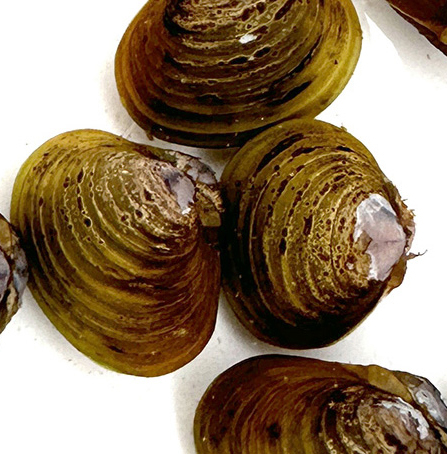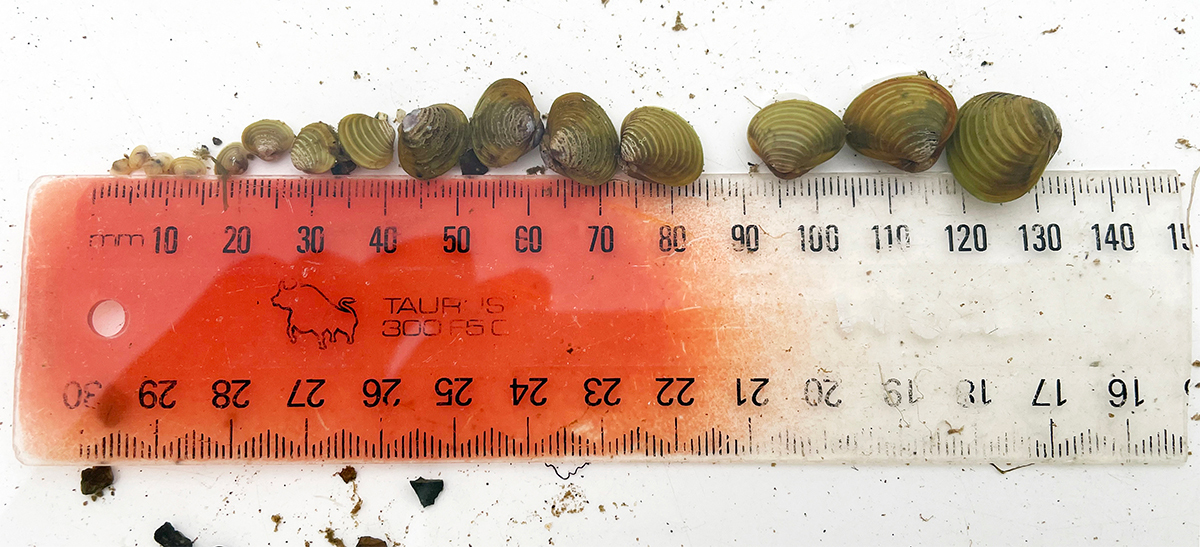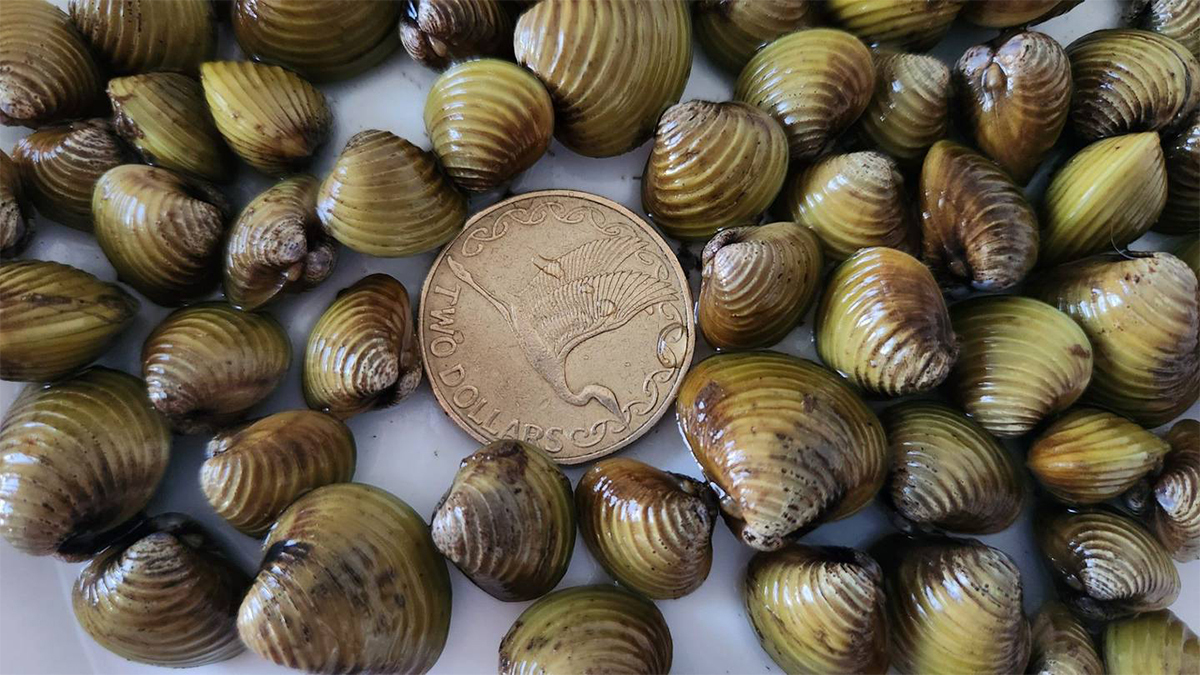
Exotic freshwater clams
Botanical names: Corbicula fluminea and corbicula australis
Two species of exotic (from overseas) freshwater clams were first found in the Waikato region in May 2023. Corbicula fluminea is native to eastern Asia and is widely established in North and South America and Europe, while Corbicula australis is native to Australia, where it is common and widely distributed.
To date there have been no exotic freshwater clams detected in the Bay of Plenty region or elsewhere in the country outside of the Waikato region.
About the clams
These 2 types of corbicula are prolific breeders, able to produce 400 juveniles a day and up to 70,000 juveniles a year, allowing them to reach extremely high densities in optimal conditions. This means they can clog water-based infrastructure, such as electricity generation plants, irrigation systems, and water treatment plants. They can also compete with native species for food and space.
Management programme
Corbicula fluminea and Corbicula australis have been given the legal status of an Unwanted Organism under the Biosecurity Act. This means that people must not knowingly move them or water that may contain them. To do so would be an offence under the Biosecurity Act.
Corbicula is not currently a listed species within the Bay of Plenty Regional Pest Management Plan (RPMP) 2020–2030 but under rule 7 of the Bay of Plenty Regional Pest Management Plan (RPMP) 2020–2030 provision is made for stopping the spread of freshwater pests by requiring all boat ramp users to certify that their vessel, craft, and trailer are free from freshwater pest fish and pest plants.
The Biosecurity New Zealand website has details of the Check Clean Dry requirements which must be used in the North Island to prevent the spread of this clam, as well as other invasives.
A key difference in the cleaning process is a requirement to soak absorbent gear like lifejackets in hot tap water (50 – 55C) for at least 5 minutes to kill sticky juvenile clams, which can be too small to see.
Rules in place to protect the Te Arawa lakes (as at 19 December 2025)
Te Arawa lakes Controlled Area Notice (CAN)
A CAN applies to the 14 Te Arawa lakes in the Bay of Plenty with additional protections for Lake Ōkataina.
For all 14 Te Arawa lakes
Any boat that has been in the Waikato River in the previous 30 days must be cleaned at a designated wash station before entering the water. This is in addition to the 'Check Clean Dry' requirements.
For Lake Ōkataina
All boats must be cleaned at a designated wash station in Rotorua before entering the lake. This is in addition to the 'Check Clean Dry' requirements.
The designated wash stations are:
At the wash station, boaties need to:
- Wash down the boat and trailer, and drain any remaining water.
- Scan the QR code in the wash bay using a phone camera, which will take you to an online form.
- Fill out and submit the form while at The Wash Place to receive 2 PIN access codes for the Lake Ōkataina boat ramp gate (this area is geo-fenced).
- Use the first 4-digit PIN received by email or text to open the gate at the boat ramp. You must use this PIN within 2 hours of receiving it.
- Use the second PIN when exiting the lake.
You can read more information about exotic freshwater clams and the restrictions in place to stop its spread on the Biosecurity New Zealand website.
19 December 2025
Te Arawa Lakes Controlled Area Notice Amendment
Biosecurity New Zealand has amended the Te Arawa Lakes and Lake Ōkataina Controlled Area Notice to include an additional wash station at Whakatāne.
The Whakatāne Boat Wash at the Whakatāne Harbour Boat Ramp, 32 Muriwai Drive, Whakatāne is a designated wash station from 19 December.
The additional station will save travel time for those travelling from the Eastern Bay of Plenty to Lake Ōkataina and Te Arawa Lakes. There is also a designated wash station at The Wash Place, 338 Te Ngae Road, Rotorua.
Any craft that has been in the Waikato River in the past 30 days must be washed at a designated wash station and have proof of cleaning before entering any of the 14 Te Arawa lakes.
To enter Lake Ōkataina, all craft must be cleaned at a designated wash station and provide proof of cleaning to receive a PIN code that allows entry to the lake.
The Controlled Area Notices (CANs) will be updated on 19 December on the MPI website Rules to stop the spread of Corbicula | NZ Government
It will take a team effort from everyone who uses our waterways to help stop the spread and protect our lakes and rivers from the invasive freshwater clam Corbicula fluminea.
This clam is a prolific breeder and can be easily spread by juveniles attaching to the surfaces of boats and water gear.
19 March 2025
New automated gate for accessing Lake Ōkataina now operational
From today, the new automated boat ramp gate provides an efficient way for boaties who have completed Check Clean Dry procedures to access Lake Ōkataina.
At the wash station, boaties need to:
- Wash down the boat and trailer, and drain any remaining water.
- Scan the QR code in the wash bay using a phone camera, which will take you to an online form.
- Fill out and submit the form while at The Wash Place to receive the PIN access codes for the Lake Ōkataina boat ramp gate (this area is geo-fenced).
- Use the first 4-digit PIN received by email and text to open the gate at the boat ramp.
- Use the second PIN when exiting the lake.
Please note - There is no overnight parking or camping allowed at the Lake Ōkataina scenic reserve.
Local iwi Ngāti Tarāwhai has successfully managed user access to the boat ramp since 2023 and the new process means that they will no longer need to be present to approve access to the lake.
The automated gate project has been led by Bay of Plenty Regional Council and funded by the Bay of Plenty Regional Council, Rotorua Lakes District Council and the Ministry for Primary Industries.
Find out about the new process and the frequently asked questions here.
5 March 2025
New date for live date of automated gate.
Due to further technical difficulties the automated gate will not be operational until Wednesday 19 March. In the interim the current process will remain in action and access to the lake will not be impacted.
25 February 2025
Due to unexpected technical issues the new automated gate will not be operational until Wednesday 5 March. In the interim the current process will remain in action and access to the lake will not be impacted.
20 February 2025
From Wednesday 26 February, a new automated gate will provide an efficient way for those who have completed Check Clean Dry procedures to access Ōkataina.
The new process:
- Go to The Wash Place (338 Te Ngae Road), wash as per instructions at the site.
- Scan the QR code in the wash bay using your phone camera, fill out the online form and submit it while at the site.
- To receive the PIN access code for the boat ramp gate you must submit the form at The Wash Place, as the area is geo-fenced.
- A unique four-digit PIN will be sent to users via text and email once the form has been submitted.
- Lake users can use the PIN code to open the gate at Lake Ōkataina, and again when exiting the lake.
Please note - There is no overnight parking or camping allowed at the Lake Ōkataina scenic reserve.
Until Wednesday, boat ramp users can continue to access the lake using the current CAN process (see above).
Local iwi Ngāti Tarāwhai has successfully managed user access to the boat ramp since 2023 and the new process means that they will no longer need to be present to approve access to the lake.
The automated gate project has been led by Bay of Plenty Regional Council and funded by the Bay of Plenty Regional Council, Rotorua Lakes District Council and the Ministry for Primary Industries.
Find out about the new process and the frequently asked questions here.

Pictured: Gate structure being installed (11 February 2025)
Bottom Content

